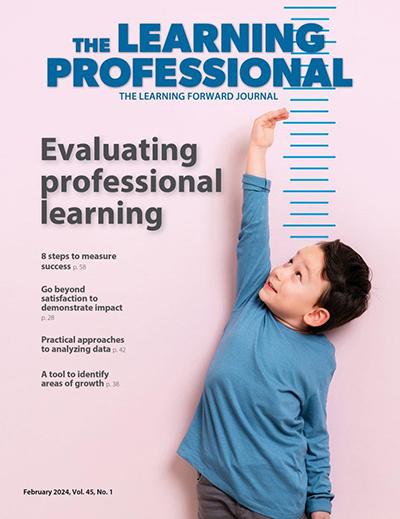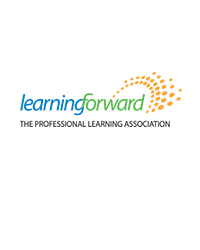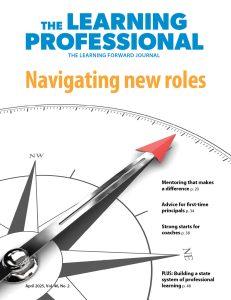Dallas, Texas – What works in K-12 educator professional learning is top of mind for state, district, and school leaders, especially now, as educators make critical spending decisions to boost student outcomes amid the 2024 sunsetting of federal COVID-relief dollars. Evaluation is the best way to determine what works, and several recent studies have shown that the quality of professional learning matters.
The latest issue of The Learning Professional, which is focused on evaluating professional learning, reports that high-quality professional learning is linked with students having access to more rigorous curriculum, multilingual students improving in literacy, and students from high-needs schools narrowing longstanding achievement gaps.
In the new issue, authors explore today’s most consequential educator professional learning issues, interpret new research in order to advance better decision-making, and share practical – and achievable – examples from schools and districts putting innovative learning agendas into practice in ways that respond to their unique challenges.
In Data Points, Learning Forward highlights a study that shows how professional learning helps ensure students’ access to rigorous curricula. RAND Corporation’s annual American Instructional Resources Survey explored whether teachers feel their students can meet the challenge level of their curriculum materials. Many teachers don’t use these materials for the majority of their instructional time because they don’t think their students are up to the challenge. However, teachers who reported that their professional learning helped them use their materials well were more likely to believe their students could do the work, therefore making it more likely that students will get access to rigorous learning opportunities.
In Research, Elizabeth Foster, Learning Forward’s senior vice president of research, shares takeaways from a recent synthesis of research studies about how professional learning helps teachers support literacy among multilingual students. Nine out of 10 studies reported positive changes in teacher knowledge and practice and high fidelity of implementation. Eleven out of 12 studies that looked at student outcomes found improvements in reading-related measures.
In Ideas, Rebecca Taylor-Perryman and colleagues document impressive student learning outcomes from their work supporting two districts’ professional learning initiatives. In South Carolina, the team supported a district’s design, implementation, and evaluation of educator professional learning for three years in an effort to boost student learning at a set of underperforming schools and also help educators collect and analyze data to better understand the impact of the work. The schools not only improved as intended, but also matched and doubled the district average growth in English language arts and math, respectively, for 2022 and 2023. In Texas, Taylor-Perryman and team supported district-level instructional coaches and school leaders in a set of schools rolling out a new districtwide math curriculum and designed an evaluation method to measure the impact of the work. Schools that received coaching grew by 0.06 standard deviations, while comparison schools decreased by 0.04 standard deviations. Schools that implemented the new curriculum but did not receive coaching decreased by 0.01 standard deviations during this time.
In Opinion, Learning Forward CEO Frederick Brown said it’s time for education leaders to undertake more of the kind of studies described in the issue, in order to document and share evidence that professional learning is making a difference for students. Parents deserve to understand how their kids’ teachers and leaders are being supported, and policymakers need to hear directly that the precious funds supporting professional learning makes a difference for students. At the district level, if school board members don’t understand the impact of professional learning, “they are less likely to prioritize dollars to support it.”
In Learning Forward’s Standards for Professional Learning, the Evidence standard calls for educators to integrate research at all stages of designing, implementing, and assessing professional learning and consider multiple research methods and approaches. The Learning Professional issue provides tools and advice to help educators and leaders conduct evaluation that is both doable and meaningful. “I have seen the phrase ‘evaluation is more important now than ever’ repeated frequently. Yet it never reads like a cliché because it is always true, and now is no exception,” The Learning Professional’s editor, Suzanne Bouffard, wrote.
The Learning Professional is Learning Forward’s flagship journal on K-12 educator professional learning research and innovative practices. The editors accept and generate articles from practitioners, education researchers, teacher leaders and learning teams, district administrators and principals that showcase professional learning best practices and demonstrate fidelity to Learning Forward’s Standards for Professional Learning (updated 2022). The magazine is published six times a year. Full access to every article is a Learning Forward member benefit.
Media notes:
Media Contact: Gail Paul, gail.paul@learningforward.org, (513) 379-8153
On deadline & need an expert to provide additional insights and/or provide comment on an educator professional learning topic from this issue? Please contact us.
The majority of articles in the digital issue are accessible to members-only. Contact us for media access to the content.









